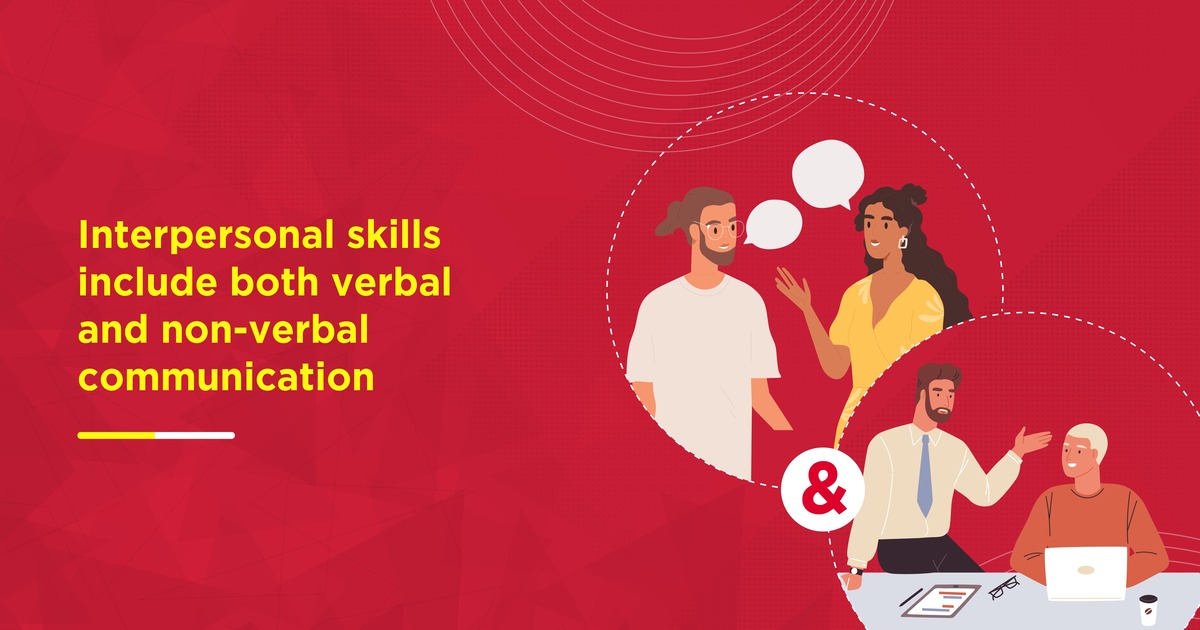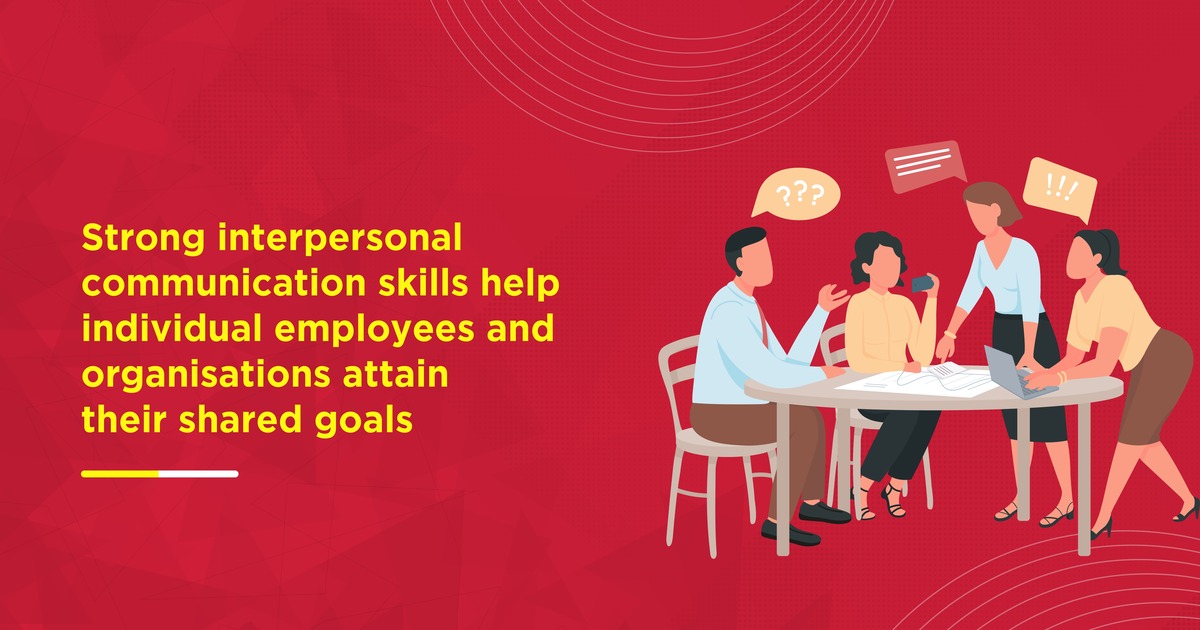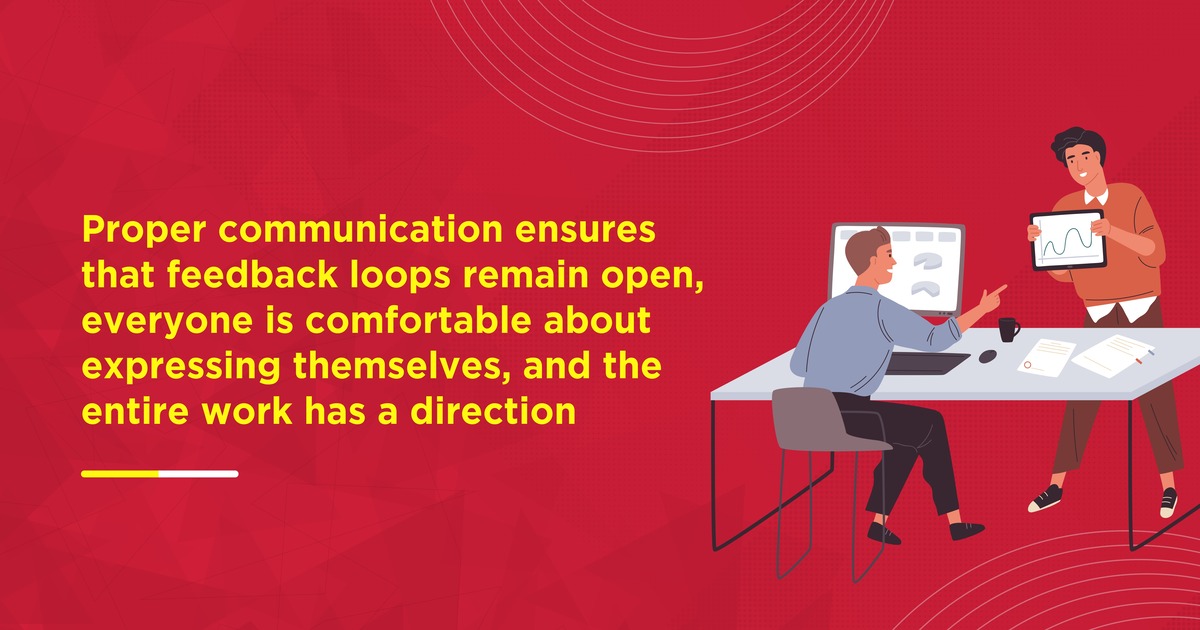Interpersonal Skills At Workplace – Importance And Ways To Improve

“Communication is an art form that is crafted throughout our lives.” -Asa Don Brown
Professional lives are busy, there are no two ways about it. However, there is a point of concern. In the rush of deadlines and meetings and client handling, the importance of nurturing interpersonal skills at work often takes a backseat. That is unfortunate since effective two-way communication has been found to boost the day-to-day efficacy of nearly 98% of employees. According to a recent report, ~85% of professional executives single out poor communication & collaboration as the prime reason behind failures/sub-optimal performances/lack of involvement at the workplace. People, of course, have to focus on their daily task schedules – but that should never be at the expense of communicating with others and working as a team. As they say, ‘No man is an island’.
All of this brings us to the importance of understanding the concept of healthy, mutually beneficial interpersonal skills at work, being clear about their importance, and learning how to build these skills in a systematic manner. We will address these points here:
What Exactly Are Interpersonal Skills?
Often referred to as ‘people skills’, interpersonal skills are the soft skills that are used for daily interactions. These skills come in handy for seamless person-to-person communications. In addition, a person with expert interpersonal skills typically finds it easier to ‘understand’ others, and react/respond accordingly.

Interpersonal Communication Skills is a Key Factor of Efficient Teamwork
Interpersonal skills include both verbal and non-verbal communication and are extremely important for effective teamwork. As a rule of thumb, these skills help people bond better with colleagues & team members and communicate well with clients. Decision-making also becomes a more collaborative effort.

Strong Interpersonal Communication Skills Helps Individuals and Organizations as well
Strong interpersonal communication skills are instrumental in helping individual employees, and organisations as a whole, attain their shared goals. However, it has to be kept in mind that these skills are multi-faceted, and include several important elements. These are:
- Communication
- Leadership
- Positivity
- The Art of Listening
Why Do Interpersonal Skills Matter?
Builds The Trust Factor
Strong interpersonal skills make communications with coworkers and team members more ‘open’ and ‘confident’. This makes a difference, particularly since a lack of openness in communication often leads to poor employee loyalty and low engagement levels. A recent American Psychological Association (APA) report revealed that 1 out of every 3 employees do not have adequate confidence in their managers – simply because the communication is not open or candid enough.
Being relatable and easily approachable are hallmarks of the best employees, since strong relatability also makes a person more dependable. Trust and confidence automatically go up when interpersonal skills are strong – paving the way for healthy work relationships.
Improves Employee Satisfaction
Every employee has a set of expectations. Now, when his/her communications with the company or the management are not adequate/up to scratch, there is – invariably – a breakdown in the working relations (a sort of ‘blind spot’ is created). Good interpersonal skills boost employee-company negotiations and clarity levels, leading to higher job-satisfaction.
Ensures Open Feedback Loops

Proper Communications Direct Organizations to Improve via Feedback
Work does not happen in a vacuum. Tasks have to be assigned, briefs have to be given, and timely, meaningful feedback needs to be provided. However, in the absence of interpersonal skills, things become a lot more ad-hoc – with baseless criticisms and counterproductive thoughts ruining the entire communication channel. Proper communication ensures that the feedback loops remain open, everyone is comfortable about expressing themselves, messages are backed up by solid information, and the entire work has a direction.
Note: Negative feedback, when based on facts, is considered to be a useful performance-building tool for 91% of employees.
Shows Empathy
People have lives outside of work. There can be external stresses, challenges, and struggles that affect the workplace performance of employees. With the help of interpersonal skills, people can develop their empathy levels – helping them ‘understand’ and truly ‘connect’ with colleagues, superiors, or juniors, and establishing a healthy collaborative environment. In such surroundings, people can work more freely, and productivity levels increase.
Managing Workplace Conflicts And Ushering In Opportunities
With the help of good interpersonal skills, an individual can become an excellent mediator. Conflicts happen (employee-employee, client-company, employee-supervisor, etc.) at workplaces – and the skill to resolve such conflicts effectively is a highly valuable one. Empathy, teamwork, body language, and negotiation expertise also are prominent elements of interpersonal skills everyone needs to nurture.
No matter how good an employee’s technical/job skills are – (s)he cannot perform in an uncomfortable environment. Lack of communication, in particular, adds to the uncertainties and acts as a major roadblock. By working on the requisite interpersonal skills both employees and employers can initiate two-way communication – opening up career development and performance enhancement opportunities.
Neglecting Interpersonal Skills At Work Can Have Serious Consequences
Companies can gloss over the importance of interpersonal skill development at their own peril. In addition to the monetary damages occurring from poor communication ( >$35K per annum, on average), other problems often crop up as well. As per the Economist Intelligence Unit report, lack of suitable interpersonal skills also leads to enhanced stress for ~53% of people, while 30% of employees also report lowered morale. Project delays and loss of business opportunities can also happen as a result of sub-optimal communication.
Why Should Companies Look For Employees With Excellent Interpersonal Skills?

Recruit People Having Good Communication Skills
In the rush to filter candidates on the basis of their professional skills and career details, it is easy to lose sight of ‘personal skills’. Companies should always make it a point to recruit people with good interpersonal skills – since these individuals have the capacity to collaborate and communicate well, ensure smooth teamwork, and going forward – become the face of the team/organisation.
Note: A recently conducted survey revealed that less than 20% of professionals have their interpersonal skills evaluated at the workplace.
Ways To Improve Interpersonal Skills At Workplace
From the above discussion, we now have a clear idea about interpersonal skills and their importance. But how can you nurture these skills, and become a better, more likeable team player? Let us turn our attention to that over here.
Focus on Active Listening
Avoid the general tendency of ‘listening to respond’. Instead of simply ‘hearing’, concentrate and really ‘listen’ to what the person in front of you is trying to convey. The speaker will feel more valued, and the overall conversation will be a lot more effective.
Work On Your Verbal & Non-Verbal Communication Skills; Be A Problem-Solver
Master the skill of verbal and nonverbal communication. Focus on communicating in a manner that actually addresses problems/issues/key topics. Avoid beating around the bush. Do not come across as too rigid.
While you are speaking/listening, the non-verbal cues (e.g. maintaining eye contact, nodding the head, etc.) can make a world of difference.
Looking towards the ground while speaking. Sitting with your shoulders hunched. Pointing fingers. Having folded arms during a presentation. All of these indicate a ‘closed’ and ‘defensive’ communication mechanism – limiting the possibilities of effective collaboration. Pay attention to what your body language is speaking, and make sure no negative signals are being sent out.
Be Interested In Others; Appreciate The Good In Everyone
If you are spending 8-9 hours everyday with the same group of people, trying to “really” know them is always a good idea. Take an active interest in their personal lives (of course within boundaries). Do not hesitate while showing your genuine appreciation for the skills of others. These can spread positivity and serve as a powerful motivation.
Respect The Thoughts Of Other People; Do Not Take Anyone For Granted
You may not agree with what the person sitting opposite to you is saying – but that does not mean that the other person can be ignored. Listen to what they are sharing, and then counter them with your own thoughts. Never get into a confrontational tone, or cut across others’ speeches. Completing sentences for others also shows an unhealthy sense of entitlement. After all, ‘agreeing to disagree’ is a thing!
Do Not Whine; Welcome Criticism & Feedback
Work pressure might be high, or there may be a series of not-so-good feedback coming in. This is where you need to maintain your equanimity, and keep your ‘game face’ on. Instead, try to understand the reasons behind the criticism/negative feedback – and make sure you do not make the same errors again. To err is human, to repeat is plain negligence.
Assert Yourself; But Use The RIGHT Language
In order to master communication and interpersonal skills, you need to be very confident about your beliefs, opinions, and of course your abilities. That will help you be assertive and authoritative in your communication. However, make sure that your language tonality (or choice of words) does not come across as derogatory or offensive.
Practise. Practise. Practise.
Perfecting the skill of interpersonal communication is never a one-shot game. You need to practise these skills everyday, in your professional as well as your personal lives. It’s all about improving everyday, learning new nuances, and growing as a person. Keep an open mind, all the time.
The ‘real costs’ of neglecting interpersonal communication skills can be immense. Annually, organisations can lose up to $35 billion due to communication silos and barriers. For 1 out of 3 employees, lack of effective collaboration also causes delays in work, missed deadlines, and resulting confusion. Surveys have shown that people can, with the help of smart interpersonal skills, take up their efficacy and productivity levels by almost 26%. Clearly, no one can afford to put these skills on the back burner.
The average performance levels of professionals with optimised interpersonal skills are likely to be 4X higher than those who lag behind on this count. Communicate well, collaborate well, and pave the way for more success – for both yourself and your organisation!

Vandana is a Human Resources Manager at Brandwizz. She Heads Talent Management at Brandwizz. Apart from work, she loves reading and listening to music.




